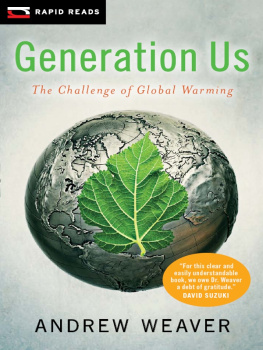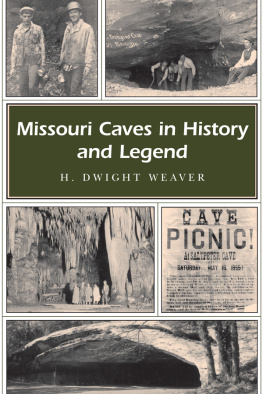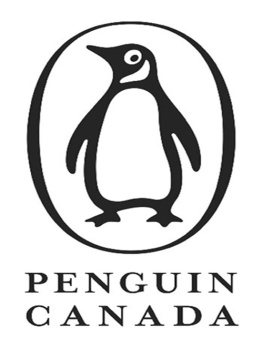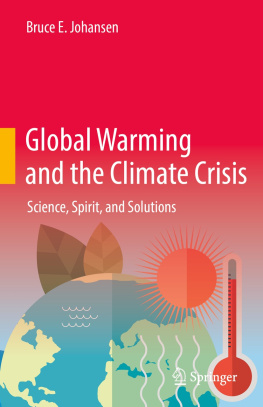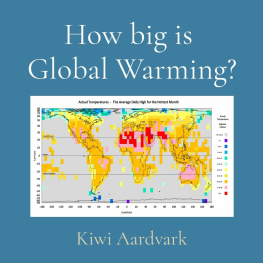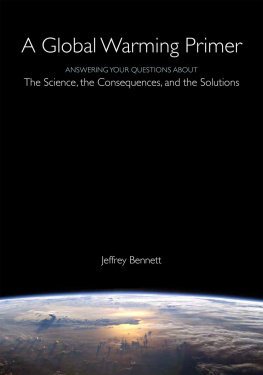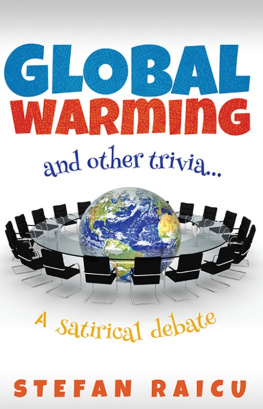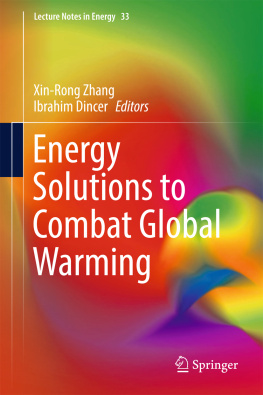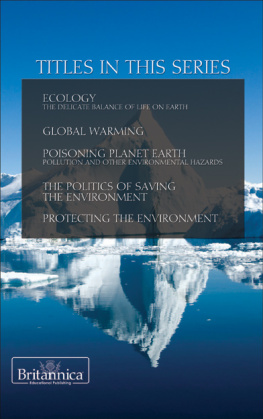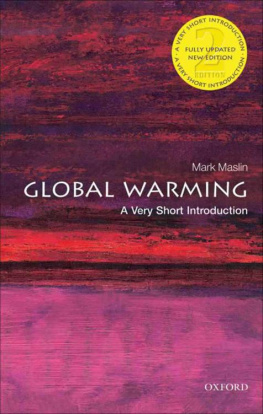Generation Us
The Challenge of Global Warming
ANDREW WEAVER

RAVEN BOOKS
an imprint of
ORCA BOOK PUBLISHERS
Copyright 2011 Andrew J. Weaver
All rights reserved. No part of this publication may be reproduced or transmitted in any form or by any means, electronic or mechanical, including photocopying, recording or by any information storage and retrieval system now known or to be invented, without permission in writing from the publisher.
Library and Archives Canada Cataloguing in Publication
Weaver, Andrew, 1961
Generation us [electronic resource] : the challenge of global warming /
written by Andrew Weaver.
(Rapid reads)
Electronic monograph in PDF format.
Issued also in print format.
ISBN 978-1-55469-805-9
1. Readers (Adult). 2. High interest-low vocabulary books.3. English language-Textbooks for second language learners. 4. Global warming.
I. Title. II. Series: Rapid reads (Online)
PE1126.A4W32 2011A 428.62 C2011-900333-3
First published in the United States, 2011
Library of Congress Control Number: 2010943311
Summary: The issues surrounding global warming are explained and solutions
offered by one of the worlds leading experts in the field.

Orca Book Publishers is dedicated to preserving the environment and has printed this
book on paper certified by the Forest Stewardship Council .
Orca Book Publishers gratefully acknowledges the support for
its publishing programs provided by the following agencies:
the Government of Canada through the Canada Book Fund and the Canada
Council for the Arts, and the Province of British Columbia through the BC Arts
Council and the Book Publishing Tax Credit.
Design by Teresa Bubela
Cover photograph by Getty Images
| ORCA BOOK PUBLISHERS | ORCA BOOK PUBLISHERS |
| PO B OX 5626, Stn. B | PO B OX 468 |
| Victoria, BC Canada | Custer, WA USA |
| V8R 6S4 | 98240-0468 |
www.orcabook.com
Printed and bound in Canada.
14 13 12 11 4 3 2 1
To the youth of today,
the decision makers of tomorrow.
Contents
The Nature of Science
and the Science of Nature
T hese days it seems hardly a day goes by that we dont hear mention of the topic of global warming. (Words in bold can be found in the .) Its on the news and in the newspapers. Its even in our daily conversation with friends. Every time there is a flood, a drought, a heavy snowfall or strong winds, someone somewhere blames it on global warming. And someone else tells us that theres nothing to worry aboutthese are just freak weather events. So who is right? Is global warming a natural phenomenon? Can we blame individual weather events on global warming? To answer these questions, we first have to clarify two issues: the meaning of the scientific method and the difference between weather and climate.
THE SCIENTIFIC METHOD
The word science comes from the Latin word scientia, meaning knowledge or skill. Nowadays, we use the word to describe our knowledge of either the natural world (natural sciences) or human society (social sciences). Subjects like physics, chemistry and biology are examples of the natural sciences, whereas economics, sociology and psychology are social sciences. In both cases, new knowledge is acquired by following a process known as the scientific method.
In the scientific method, a natural or social scientist starts off by identifying a phenomenon that he or she wants to try to understand. For example, a biologist might want to know why cedar trees grow better in one valley than in another. The scientist then observes the phenomenon by collecting data that help describe it as completely as possible. This is called the observational stage. In the case of the biologist, he or she might collect tree and soil samples for analysis back in the laboratory. He or she might also try to find out what nearby weather data are available.
Next, the scientist will make an educated guess as to why the phenomenon appears the way it does. This is known as the hypothesis stage. For example, after examining the soils from both valleys and finding out that one contains fewer nutrients (natural fertilizer), the biologist might suppose that this observation explains the difference in how the cedar trees grow. In the third stage, the scientist uses the educated guess (or hypothesis) to predict what will happen to the phenomenon in different situations. This is called the prediction stage. Our biologist might predict that the struggling cedar trees would grow better if nutrients (fertilizer) were added to their soils.
In the final experimental stage, experiments are designed to test the predictions. If the predictions are correct, the hypothesis standsat least for now. If the predictions fail, the new experimental observations would have to be recorded, the hypothesis or explanation would have to be modified, and the whole process would repeat itself.
So if, after adding fertilizer, our biologist finds that there is no effect on the cedar trees, he or she will have to come up with a new hypothesis and new experiments. The biologist might have noted in the observational stage that rainfall was different in the two valleys and that the thriving cedar trees received more rain than the other trees. He or she could then conduct an experiment that involved watering the trees in the drier valley. If they started to thrive, the biologist would have an explanation for the differences in the growth pattern of the trees in the two valleys.
In summary, science seeks to develop the understanding of a particular phenomenon that explains all known observations of it. In this book the phenomenon that we seek to explain is the Earths warming over the last 130 years. This is the phenomenon that we know as global warming.
CLIMATE IS DIFFERENT FROM WEATHER
When you get up in the morning and look out the window to decide what clothes you are going to wear, you are concerned about the weather. In January, you are thinking about the climate as you pack appropriate clothes in your suitcase before heading to Hawaii for a winter holiday. Put another way, climate is what you expect; weather is what you get.
We expect the average temperature at JFK Airport in New York to be 32F (0C) in January, but on any given January day it may be much warmer or colder. Climate refers to the likelihood of occurrence of any given weather event rather than the weather event itself. This is important since it means that scientists can never blame an individual hurricane, rainfall, heat wave or drought on global warming. Rather, they can only say that such events may become more or less likely in a particular region. And they can assign a probability to how much more or less likely they will be.
Understanding the distinction between weather and climate is an important first step in understanding how scientists are able to make future projections about global warming. Climate scientists do not make long-range weather predictions. They instead try to estimate the change in average conditions and the likelihood of occurrence of any particular weather event. For example, making a prediction that next Saturday in Washington, DC, it will be cloudy with sunny breaks, with a high of 68F (20C) and a low of 59F (15C), is a weather forecast. Predicting that average summer temperatures over eastern North America will warm by 6F (3C) by the end of this century and that, at the same time, total winter precipitation will increase by about 11% is a climate prediction. Predicting that summer will be warmer than winter is a pretty safe bet. But by doing so, you are making a climate prediction. Understanding global warming involves understanding what affects the amount of energy the Earth receives from the sun and the amount of energy the Earth emits back to space.
Next page
